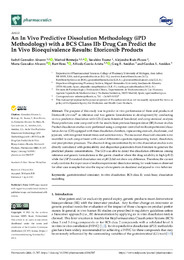Título :
AnInVivoPredictive Dissolution Methodology (iPD Methodology) with a BCS Class IIb Drug Can Predict the In Vivo Bioequivalence Results: Etoricoxib Products |
Autor :
Gonzalez-Alvarez, Isabel 
Bermejo, Marival
Tsume, Yasuhiro 
Ruiz Picazo, Alejandro 
Gonzalez-Alvarez, Marta 
Hens, Bart 
García Arieta, Alfredo 
Amidon, Greg E.
Amidon, Gordon  |
Editor :
MDPI |
Departamento:
Departamentos de la UMH::Ingeniería |
Fecha de publicación:
2021-04 |
URI :
https://hdl.handle.net/11000/35159 |
Resumen :
The purpose of this study was to predict in vivo performance of three oral products of Etoricoxib (Arcoxia® as reference and two generic formulations in development) by conducting in vivo predictive dissolution with GIS (Gastro Intestinal Simulator) and computational analysis. Those predictions were compared with the results from previous bioequivalence (BE) human studies. Product dissolution studies were performed using a computer-controlled multicompartmental dissolution device (GIS) equipped with three dissolution chambers, representing stomach, duodenum, and jejunum, with integrated transit times and secretion rates. The measured dissolved amounts were modelled in each compartment with a set of differential equations representing transit, dissolution, and precipitation processes. The observed drug concentration by in vitro dissolution studies were directly convoluted with permeability and disposition parameters from literature to generate the predicted plasma concentrations. The GIS was able to detect the dissolution differences among reference and generic formulations in the gastric chamber where the drug solubility is high (pH 2) while the USP 2 standard dissolution test at pH 2 did not show any difference. Therefore, the current study confirms the importance of multicompartmental dissolution testing for weak bases as observed for other case examples but also the impact of excipients on duodenal and jejunal in vivo behavior
|
Palabras clave/Materias:
gastrointestinal simulator
in vitro dissolution
BCS class II
weak base
dissolution modelling |
Área de conocimiento :
CDU: Ciencias aplicadas: Ingeniería. Tecnología |
Tipo de documento :
info:eu-repo/semantics/article |
Derechos de acceso:
info:eu-repo/semantics/openAccess
Attribution-NonCommercial-NoDerivatives 4.0 Internacional |
DOI :
https://doi.org/10.3390/ pharmaceutics13040507 |
Publicado en:
. Pharmaceutics 2021, 13, 507 |
Aparece en las colecciones:
Artículos - Ingeniería
|
 La licencia se describe como: Atribución-NonComercial-NoDerivada 4.0 Internacional.
La licencia se describe como: Atribución-NonComercial-NoDerivada 4.0 Internacional.
.png)
